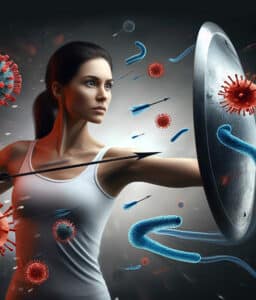Why drink water?
Water is our most important source of energy. Of course, we do not get energy directly from water - in the sense that the body does not convert water into energy. However, it is water that ensures the movement of all substances in our body:
- With the help of water, our organs receive all the substances necessary for their functioning.
- Water removes toxins from our bodies along with sweat and urine.
If there is not enough water in the body:
- Enzymatic activity decreases - we become slower and work capacity decreases.
- Metabolic processes are disrupted - problems with hair, nails, skin begin, and chronic diseases worsen.
Water - a prerequisite for weight loss
One of the main prerequisites for weight loss is the consumption of large amounts of water. Water helps to lose weight, because if the body does not get enough fluid, oxygen begins to flow more slowly to the muscles. Muscles are the biggest consumers of energy in our body, and if they start consuming less energy, the rate of "burning" fat is greatly reduced. Water is involved in all body processes, including lipolysis (the breakdown of fat).
The body responds to water scarcity much more strongly than to the scarcity of other substances. When the body's cells lack water, the metabolic activity instantly decreases, and a person may experience fatigue, become distracted and restless.
If you are tired or have difficulty concentrating - drink water!
The benefits of water for weight loss have not been invented - this is a scientifically proven fact, confirmed by many laboratory studies, during which it was found that by drinking water regularly and abundantly, the body undergoes processes that are very important for weight loss.
Hunger is reduced - drink water and the feeling of hunger will decrease, then the risk of overeating will decrease.
When you are hungry you usually look for food, but food may not be what your body needs because of the thirst caused by mild dehydration, the brain is often confused with hunger. If your body needs water instead of calories - you will be able to reduce your appetite by drinking water.
Even if the body needs food, drinking water shortly before a meal can help reduce your intake. This is confirmed by studies such as:
- How to consume water before eating reduces food consumption - People who drank two glasses of water just before eating ate 22% less than those who did not drink water before eating.
- Effects of increased water intake on body weight, body mass index, body fat mass and appetite overweight women - 50 overweight women drank 500 milliliters (ml) of water 30 minutes before breakfast, lunch and dinner for 8 weeks in addition to their usual water intake and reduced both body weight and body fat. Study participants also reported decreased appetite.
Water can speed up your metabolism.
Drinking water stimulates body thermogenesis - Your body needs to use energy to warm its fluid intake to body temperature, and the more energy your body consumes, the faster your metabolism (the process by which your body converts energy into what you eat and drink). In particular, in a study published in the Journal of Clinical Endocrinology & Metabolism in 2003, drinking about two glasses of water at about 21.5 ° C resulted in a short - term increase in mean metabolic rate of 30% in 14 healthy adults (metabolic rate increased within 10 minutes and peaked after 30-40 minutes).
However, before you start drinking large amounts of water, keep in mind that the effects of thermogenesis will not cause a significant caloric deficit, which will cause weight loss, but too much water intake is likely to cause unpleasant indigestion. Remember - everything in moderation!
Drinking water helps reduce your total fluid calorie intake.
Because water does not contain calories when drinking water, it is not high-calorie drinks such as juices, sweetened carbonated drinks, sweetened tea or coffee, etc. You can reduce your total liquid calories. Choose water and for every 500ml you drink, you will drink on average 250 calories less.
Helps achieve better results during training.
Water is especially important for the body during training, because during exercise, the body loses fluid faster and dehydration can begin. When muscle cells are dehydrated, muscle formation is slower, so your workouts are much less effective. In addition, electrolyte imbalance can occur, which can lead to seizures, but this is not the only side effect if you drink too little.
To avoid dehydration, always drink water before, during and after your workout - especially if you exercise in hot, humid or very sunny weather.
Water helps the body excrete waste.
Drinking water facilitates the formation of urine and the movement of faeces (because water keeps them soft). In other words, if the body has the optimal amount of water, it is easier to move substances and you are less likely to suffer from constipation and bloating.
In addition, adequate hydration promotes kidney function, flushes out harmful bacteria from the urinary tract and reduces the risk of kidney stones.
The body needs water to burn fat.
Water promotes fat metabolism - lipolysis. The first step in this process is hydrolysis, where water molecules interact with triglycerides (fats) to form glycerin and fatty acids.
Water is needed to burn both the fat in food and drink and the accumulated fat reserves - if it is not enough, the process slows down or even stops.
Water can reduce stress and improve mood.
When your body is short of water, you may experience symptoms such as tiredness, drowsiness, dizziness and difficulty concentrating - as a result of which you are exposed to various stressful situations. Studies have shown that under dehydration, the production of cortisol or stress hormone also increases.
Read more about the effects of a healthy diet on mood HERE.
The body stops retaining fluid in the tissues - the edema disappears, which is a significant percentage of excess weight.
The body is saturated with various trace elements present in water and actively participates in metabolism, such as: calcium, potassium, magnesium, iron, zinc, fluorine, sodium, etc.
Therefore, you need to drink plenty of water every day. It is considered necessary to drink 1 milliliter of water for each calorie burned. Of course, everything is strictly individual. But a woman who exercises regularly and wants to lose weight is recommended to drink about three liters of water a day on average. People are not used to drinking clean water, replacing it with carbonated drinks, tea, coffee. However, preference should be given to pure raw water over boiled, distilled water, etc. Water should be drunk 30-40ml per kilogram of body weight throughout the day - every hour by the glass.
And remember - you should drink water not because you feel thirsty, but because your body needs it - in small amounts and regularly. Thirst is not a signal that the amount of water in your body is declining, but a warning that your body is starting to dehydrate and urgently needs water. When you start to thirst - your body has already lost about 1% of fluid.
Recommended amount of water depending on your level of physical activity
Your weight (kg) | Low physical activity | Moderate physical activity | High physical activity |
50 | 1.5l | 2.0l | 2.3l |
60 | 1.8l | 2,3 | 2.6l |
70 | 2.2l | 2.5l | 3.0l |
80 | 2.5l | 2.9l | 3.3l |
90 | 2.8l | 3.3l | 3.6l |
100 | 3.1l | 3.6l | 3.8l |
But remember - although water does not contain calories, you should not overdo it with drinking water - if you fanatically drink 4 or even 5 liters a day, instead of 2l, for example, your body will resist this type of indigestion time.

Help to maintain this site, create interesting articles and delicious low-calorie recipes!
Share this article
Follow me on Facebook
I recommend reading these articles as well

Mediterranean diet
The Mediterranean diet is inscribed on the UNESCO List of the Intangible Cultural Heritage of Humanity. What is the Mediterranean diet and why is it so highly valued?

The best sources of protein
Why do we need protein and with what products is it best to absorb it?


Spices and herbs
What flavor does each particular spice affect? Which spices go well with each other? What spices to add to what dishes?

